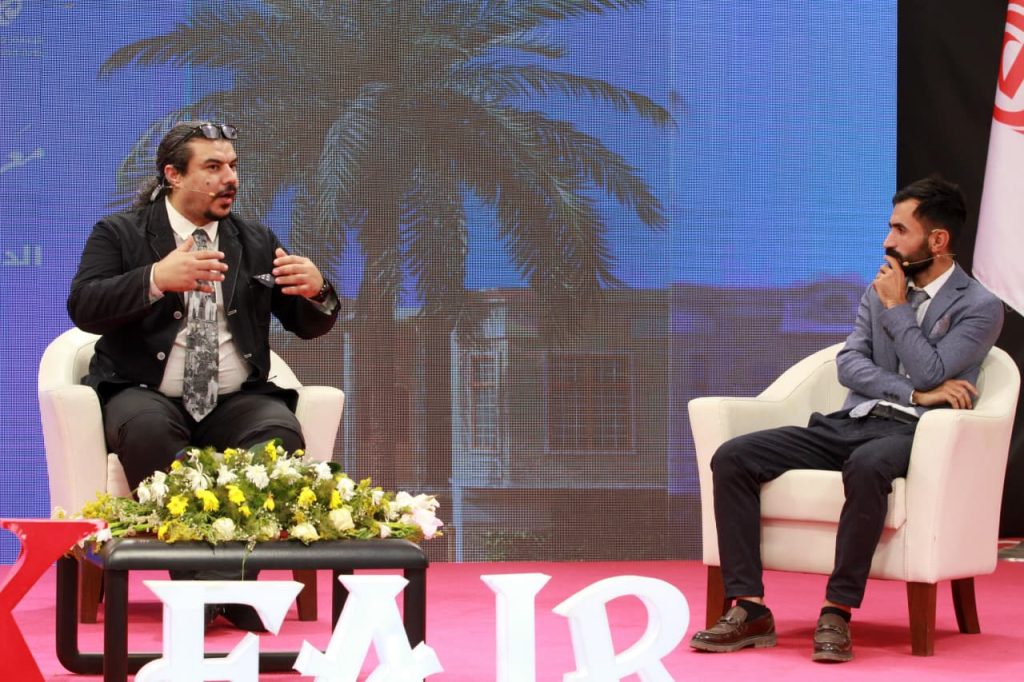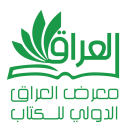
Harith Rasmi Al-Hiti
Photography by Mahmoud Raouf
In one of the dialogue sessions held in the seminar hall, there was a discussion of the importance of encouraging initiatives to borrow and circulate the book, moderated by the journalist Imad Al-Shara and the guest of Mr. Kamran Kamal and Mr. Sajjad Saleh from Saleh Castle.
Al-Shara, who began the session by talking about what he called magic, indicating that “as soon as we catch the book suddenly we feel like a vehicle that takes us away in the space of knowledge, near this magic there is an important phenomenon transmitted by generations, which is the borrowing of the book so that some, whatever he has from a large library and contains important and large titles, but he loves that the book remains living the state of borrowing and transmission between friends and acquaintances. As if it were a link of communication and communication that is meant not to stop between friends, loved ones and cultures.”
Kamran Kamal, who comes from Sinjar to the second session of the Iraq International Book Fair, tells us about his experience about borrowing the book, and the importance of his presence here at the fair comes to convey another image of Sinjar other than the one that was entrenched in our minds about captivity and crimes of ISIS, speaking about his experience, saying, “As soon as ISIS entered Sinjar and displaced its people in large numbers from the region towards Kurdistan, and there began the difficult life in the camps, where families suffer from great and dangerous psychological pressure in the now Himself, from there and with my harsh personal circumstances, the idea was launched, as I own a few books, not exceeding 10 books that I collected from friends and loved ones, I read them at the beginning and through social media platforms explained them and wrote an announcement that these books can be borrowed and put in the hashtag the number of the tent I live in and the number of the cutter, through this initiative and after about two months, the number of books in the library reached about 200 books in my first year in the camp, and I turned the tent During the four years I lived in the camp, my tent turned into a large library for borrowing, frequented by many and different groups in the camp where I live or in the nearby camps.”
“I used to see the change that is happening in the camp at the level of awareness and interest in books through my tent or what we called the camp library, from here the dream began that if I return to my city of Sinjar, I will open a library, and Sinjar does not contain any library at all since the regime of Saddam Hussein until today. In 2019, I returned to Sinjar, to my completely demolished house alone, and I built one room for me after my family refused to return because they could not at the time, and I lived there, and launched a campaign to collect books within the judiciary and the governorate in general, and there are many who responded to me by donating books or material amounts, and the strange thing is that the donations I received from many Iraqi provinces and from people I do not know at all. Today, after I got a piece of land from the municipality inside a public park, the library has many books and various titles and has almost a literary and knowledge session every week.”
While Sajjad from the Qal’at Saleh area talks about the idea of borrowing there he says, “Personally, the issue of borrowing books began with me long before I entered the university stage, we have at home a library for my parents, from which I entered the world of books and reading, and I had a friend who lent me the first book I read, and then I started buying books after I really felt the change that hit me as a result of that, and from here I was convinced to give others a book and from it they get to know the world of books, so entering the university, helped me to promote for books at the College of Science at the University of Basra.”
Sajjad adds, “After graduation, I met a group from my hometown Qal’at Saleh, they had the idea of a cultural festival, I entered with them in this project, the topic was repeated every period, and we began to stimulate the subject more, especially the distribution of our personal books and the idea of borrowing the book, there is a thirst for reading and knowledge.
